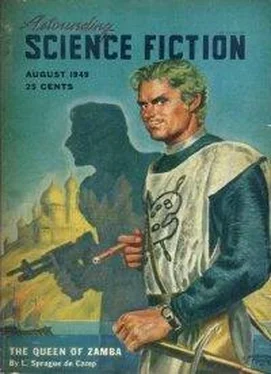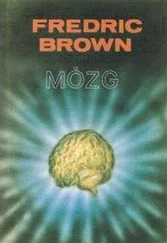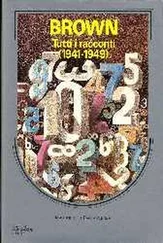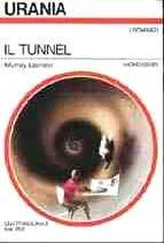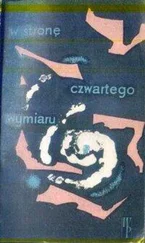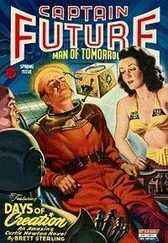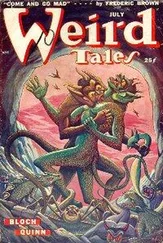Fredric Brown - Letter to a Phoenix
Здесь есть возможность читать онлайн «Fredric Brown - Letter to a Phoenix» весь текст электронной книги совершенно бесплатно (целиком полную версию без сокращений). В некоторых случаях можно слушать аудио, скачать через торрент в формате fb2 и присутствует краткое содержание. Год выпуска: 1949, Издательство: Street & Smith Publications, Inc., Жанр: Юмористическая фантастика, на английском языке. Описание произведения, (предисловие) а так же отзывы посетителей доступны на портале библиотеки ЛибКат.
- Название:Letter to a Phoenix
- Автор:
- Издательство:Street & Smith Publications, Inc.
- Жанр:
- Год:1949
- ISBN:нет данных
- Рейтинг книги:5 / 5. Голосов: 1
-
Избранное:Добавить в избранное
- Отзывы:
-
Ваша оценка:
- 100
- 1
- 2
- 3
- 4
- 5
Letter to a Phoenix: краткое содержание, описание и аннотация
Предлагаем к чтению аннотацию, описание, краткое содержание или предисловие (зависит от того, что написал сам автор книги «Letter to a Phoenix»). Если вы не нашли необходимую информацию о книге — напишите в комментариях, мы постараемся отыскать её.
Letter to a Phoenix — читать онлайн бесплатно полную книгу (весь текст) целиком
Ниже представлен текст книги, разбитый по страницам. Система сохранения места последней прочитанной страницы, позволяет с удобством читать онлайн бесплатно книгу «Letter to a Phoenix», без необходимости каждый раз заново искать на чём Вы остановились. Поставьте закладку, и сможете в любой момент перейти на страницу, на которой закончили чтение.
Интервал:
Закладка:
Letter to a Phoenix
by Fredric Brown
There is much to tell you, so much that it is difficult to know where to begin. Fortunately, I have forgotten most of the things that have happened to me. Fortunately, the mind has a limited capacity for remembering. It would be horrible if I remembered the details of a hundred and eighty thousand years—the details of four thousand lifetimes that I have lived since the first great atomic war.
Not that I have forgotten the really great moments. I remember being on the first expedition to land on Mars and the third to land on Venus. I remember—I believe it was in the third great war—the blasting of Skora from the sky by a force that compares to nuclear fission as a nova compares to our slowly dying sun. I was second in command on a Hyper-A Class spacer in the war against the second extragalactic invaders, the ones who established bases on Jupe’s moons before we knew they were there and almost drove us out of the Solar System before we found the one weapon they couldn’t stand up against. So they fled where we couldn’t follow them, then, outside of the Galaxy. When we did follow them, about fifteen thousand years later, they were gone. They were dead three thousand years.
And this is what I want to tell you about—that mighty race and the others—but first, so that you will know how I know what I know, I will tell you about myself.
I am not immortal. There is only one immortal being in the universe; of it, more anon. Compared to it, I am of no importance, but you will not understand or believe what I say to you unless you understand what I am.
There is little in a name, and that is a fortunate thing—for I do not remember mine. That is less strange than you think, for a hundred and eighty thousand years is a long time and for one reason or another I have changed my name a thousand times or more. And what could matter less than the name my parents gave me a hundred and eighty thousand years ago?
I am not a mutant. What happened to me happened when I was twenty-three years old, during the first atomic war. The first war, that is, in which both sides used atomic weapons—puny weapons, of course, compared to subsequent ones. It was less than a score of years after the discovery of the atom bomb. The first bombs were dropped in a minor war while I was still a child. They ended that war quickly, for only one side had them.
The first atomic war wasn’t a bad one—the first one never is. I was lucky for, if it had been a bad one—one which ended a civilization—I’d not have survived it despite the biological accident that happened to me. If it had ended a civilization, I wouldn’t have been kept alive during the sixteen-year sleep period I went through about thirty years later. But again I get ahead of the story.
I was, I believe, twenty or twenty-one years old when the war started. They didn’t take me for the army right away because I was not physically fit. I was suffering from a rather rare disease of the pituitary gland—Somebody’s syndrome. I’ve forgotten the name. It caused obesity, among other things. I was about fifty pounds overweight for my height and had little stamina. I was rejected without a second thought.
About two years later my disease had progressed slightly, but other things had progressed more than slightly. By that time the army was taking anyone; they’d have taken a one-legged one-armed blind man if he was willing to fight. And I was willing to fight. I’d lost my family in a dusting, I hated my job in a war plant, and I had been told by doctors that my disease was incurable and I had only a year or two to live in any case. So I went to what was left of the army, and what was left of the army took me without a second thought and sent me to the nearest front, which was ten miles away. I was in the fighting one day after I joined.
Now I remember enough to know that I hadn’t anything to do with it, but it happened that the time I joined was the turn of the tide. The other side was out of bombs and dust and getting low on shells and bullets. We were out of bombs and dust, too, but they hadn’t knocked out all of our production facilities and we’d got just about all of theirs. We still had planes to carry them, too, and we still had the semblance of an organization to send the planes to the right places. Nearly the right places, anyway; sometimes we dropped them too close to our own troops by mistake. It was a week after I’d got into the fighting that I got out of it again—knocked out of it by one of our smaller bombs that had been dropped about a mile away.
I came to, about two weeks later, in a base hospital, pretty badly burned. By that time the war was over, except for the mopping up, and except for restoring order and getting the world started up again. You see, that hadn’t been what I call a blow-up war. It killed off—I’m just guessing; I don’t remember the fraction—about a fourth or a fifth of the world’s population. There was enough productive capacity left, and there were enough people left, to keep on going; there were dark ages for a few centuries, but there was no return to savagery, no starting over again. In such times, people go back to using candles for light and burning wood for fuel, but not because they don’t know how to use electricity or mine coal; just because the confusions and revolutions keep them off balance for a while. The knowledge is there, in abeyance until order returns.
It’s not like a blow-up war, when nine-tenths or more of the population of Earth—or of Earth and the other planets is killed. Then is when the world reverts to utter savagery and the hundredth generation rediscovers metals to tip their spears.
But again I digressed. After I recovered consciousness in the hospital, I was in pain for a long time. There were, by then, no more anesthetics. I had deep radiation burns, from which I suffered almost intolerably for the first few months until, gradually, they healed. I did not sleep—that was the strange thing. And it was a terrifying thing, then, for I did not understand what had happened to me, and the unknown is always terrifying. The doctors paid little heed—for I was one of millions burned or otherwise injured—and I think they did not believe my statements that I had not slept at all. They thought I had slept but little and that I was either exaggerating or making an honest error. But I had not slept at all. I did not sleep until long after I left the hospital, cured. Cured, incidentally, of the disease of my pituitary gland, and with my weight back to normal, my health perfect.
I didn’t sleep for thirty years. Then I did sleep, and I slept for sixteen years. And at the end of that forty-six-year period, I was still, physically, at the apparent age of twenty-three.
Do you begin to see what had happened as I began to see it then? The radiation—or combination of types of radiation—I had gone through, had radically changed the functions of my pituitary. And there were other factors involved. I studied endocrinology once, about a hundred and fifty thousand years ago, and I think I found the pattern. If my calculations were correct, what happened to me was one chance in a great many billions.
The factors of decay and aging were not eliminated, of course, but the rate was reduced by about fifteen thousand times. I age at the rate of one day every forty-five years. So I am not immortal. I have aged eleven years in the past hundred and eighty millennia. My physical age is now thirty-four.
And forty-five years is to me as a day. I do not sleep for about thirty years of it—then I sleep for about fifteen. It is well for me that my first few “days” were not spent in a period of complete social disorganization or savagery, else I would not have survived my first few sleeps. But I did survive them and by that time I had learned a system and could take care of my own survival. Since then, I have slept about four thousand times, and I have survived. Perhaps someday I shall be unlucky. Perhaps someday, despite certain safeguards, someone will discover and break into the cave or vault into which I seal myself, secretly, for a period of sleep. But it is not likely. I have years in which to prepare each of those places and the experience of four thousand sleeps back of me. You could pass such a place a thousand times and never know it was there, nor be able to enter if you suspected.
Читать дальшеИнтервал:
Закладка:
Похожие книги на «Letter to a Phoenix»
Представляем Вашему вниманию похожие книги на «Letter to a Phoenix» списком для выбора. Мы отобрали схожую по названию и смыслу литературу в надежде предоставить читателям больше вариантов отыскать новые, интересные, ещё непрочитанные произведения.
Обсуждение, отзывы о книге «Letter to a Phoenix» и просто собственные мнения читателей. Оставьте ваши комментарии, напишите, что Вы думаете о произведении, его смысле или главных героях. Укажите что конкретно понравилось, а что нет, и почему Вы так считаете.
